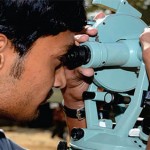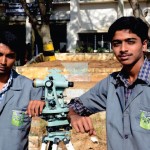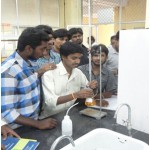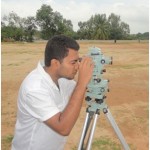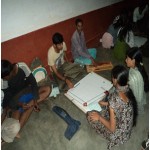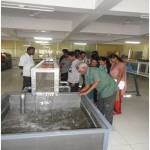Departments
Civil Engineering
Civil Engineering department was started in the year 2009 with an intake of 60. The institution is affiliated to Visvesvaraya Technological University, Belgaum and is striving to growas one of the finest centers.
Civil engineering is a professional engineering discipline that deals with the design, construction and maintenance of the physically built structures like bridges, roads, canals, dams and buildings etc. and also it will take care of naturally built environment. Civil engineering is the broadest of the engineering fields. Civil engineers build the world’s infrastructure. It is an age-old profession and has been defined traditionally as a great art, on which the wealth and thewell-being of the whole of society depend.
Quality Policy
- We are committed for achieving and reviewing the established quality objectives of our organization.
- To provide an academic atmosphere to develop overall personalities of our students and a promise of exciting career.
- We shall strive continually to progressively develop seeking broad avenues to face the challenging and emerging needs of our society.
Vision
“To achieve excellence in Technology, Innovation and Research in ethical way to lead and serve the nation”
Mission
Create and develop sustained environment of learning, to produce high caliber and dynamic Civil Engineers with due consideration of Economy, Ecology and Ethical issues of nation and to provide services to society and construction industry to assist in developing capabilities globally with respect to Science, Technology and Research.
Program Outcomes (POs)
At the end of the B.E program, students are expected to have developed the following outcomes.
1. Engineering Knowledge: Apply the knowledge of mathematics, science, engineering fundamentals, and an engineering specialization to the solution of complex engineering problems.
2. Problem analysis: Identify, formulate, research literature, and analyze complex engineering problems reaching substantiated conclusions using first principles of mathematics, natural sciences, and engineering sciences.
3. Design/development of solutions: Design solutions for complex engineering problems and design system components or processes that meet the specified needs with appropriate consideration for the public health and safety, and the cultural, societal, and environmental considerations.
4. Conduct investigations of complex problems: Use research-based knowledge and research methods including design of experiments, analysis and interpretation of data, and synthesis of the information to provide valid conclusions.
5. Modern Tool Usage: Create, select, and apply appropriate techniques, resources, and modern engineering and IT tools including prediction and modeling to complex engineering activities with an understanding of the limitations.
6. The Engineer and Society: Apply reasoning informed by the contextual knowledge to assess societal, health, safety, legal, and cultural issues and the consequent responsibilities relevant to the professional engineering practice.
7. Environment and Sustainability: Understand the impact of the professional engineering solutions in societal and environmental contexts, and demonstrate the knowledge of need for sustainable development.
8. Ethics: Apply ethical principles and commit to professional ethics and responsibilities and norms of the engineering practice.
9. Individual and Team Work: Function effectively as an individual, and as a member or leader in diverse teams, and in multidisciplinary settings.
10. Communication: Communicate effectively on complex engineering activities with the engineering community and with society at large, such as, being able to comprehend and write effective reports and design documentation, make effective presentations, and give and receive clear instructions.
11. Project Management and Finance: Demonstrate knowledge and understanding of the engineering and management principles and apply these to one’s own work, as a member and leader in a team, to manage projects and in multidisciplinary environments.
12. Life-long learning: Recognize the need for, and have the preparation and ability to engage in independent and life-long learning in the broadest context of technological change.
Program Specific Outcomes (PSOs)
At the end of the B.E Civil Engineering program, the students are expected to have developed the following program specific outcomes.
PSO1 Graduates will be able to apply technical skills and modern engineering tools for civil engineering day to day practice.
PSO2 Graduates will be able to participate in critical thinking and problem solving of civil engineering field that requires analytical and design requirements.
PSO3 Graduates will be able to pursue of lifelong learning and professional development to face the challenging and emerging needs of our society.
Programme Educational Objectives
PEO#I: Graduates will able to apply fundamental principles of science, mathematics and engineering using modern tools to solve the societal and environmental problems.
PEO#II: Graduates are able to use their practical, field survey, computer and analytic skills to build industry ready engineers to solve multi-disciplinary sustainable projects.
PEO#III: Graduate applies innovative ideas to improve the technical competency in engineering decisions, lifelong learning, to equip leadership qualities in diverse teams, promote and practice appropriate ethical morale to become professional engineers.
Departmental Profile
- Department of Civil Engineering is one of the oldest branch, At ACSCE was started in the year 2009 the department has been imparting quality education to meet the technological advancement and industrial requirements. This has been made possible due to qualified and dedicated faculty, state of the art laboratories and infrastructure facilities. The total student intake at present for BE (Civil Engineering) is 60.
- The Postgraduate program in Structural Engineering has been started from the academic year 2013-2014 with an intake of 18 students
Departmental Activities
- Tata Consultancy Services (TCS) – arranged “CODE VITA” on 7/8/2013 India’s biggest coding challenge for all the semester students.
- A technical talk on construction management was organized by Karnataka German technical training institute (KGTTI) on 16/9/2013 for 7th semester students.
- A technical talk on “Beauty and power of Engineering” was held on 27/9/2013 for all the semester students.
- A talk on GATE examination was held by GATE forum on 20/9/2013 for 7th semester students.
- Eye awareness program was held on 25/09/2013 for all the semester students.
CE – SAR
Civil SARCE – MOU
CCCL FE Designers 3E CADD Centre Civil Soft CMTICE – Enrichment
2020-21 2018-19 2017-18 2016-17CE – Event Conduction
2016-17 2017-18 2018-19 2019-20 2020-21CE – Faculty Publication
View Faculty Publication for the year 2020-21Journal Club
Research communities often uphold the ideal of scientific collaboration. “collaboration” really meansThe picture that comes to mind can be people sitting, talking, and exchanging ideas that push toward the goal of creating better health. Exchange practically happens by one way is through a journal club.
The purpose of a journal club are as follows
A journal club is a regular gathering of Lectures and students to discuss a scientific paper found in a research journal. One or two members of the club present a summary of the chosen paper that the whole group has read.
- Know the background material.
- Make your presentation concise.
- Simplify unfamiliar concepts.
- Ask questions about the paper before present.
- Ask specific questions to the members of the journal club.
CE – Infrastructure
The department has the following state-of-the-art laboratories, Applied Engineering Geology Lab, Hydraulics and Hydraulic Machinery Lab, Survey Lab with advanced surveying equipment’s, Computer Aided Design Lab, Basic aterial Testing Lab, Geotechnical Engineering Lab, Environmental Engineering Lab, Concrete and HighwayMaterial Lab
Laboratory Facilities
The department has well equipped laboratory facilities as per University norms with latest instruments such as Universal testing Machine, Total Station, UV Spectrophotometer, Colony counter, Direct shear test Machine, Proctor Compaction Apparatus, Abrasion Testing Machine, Francis Turbine; Kaplan Turbine; Pelton Wheel Turbine; Hydraulic Flume; Centrifugal Pump Set. Computer aided Design laboratory having licensed version software’s such as AutoCAD and Stadd Pro etc.
CE – Internship
View Internship Details 2020-21 View Internship Details 2019-20 View Internship Details 2018-19CE – Newsletter
View Newsletter Volume 1View Newsletter Volume 2
View Newsletter Volume 3
View Newsletter Volume 4
View Newsletter Volume 5










